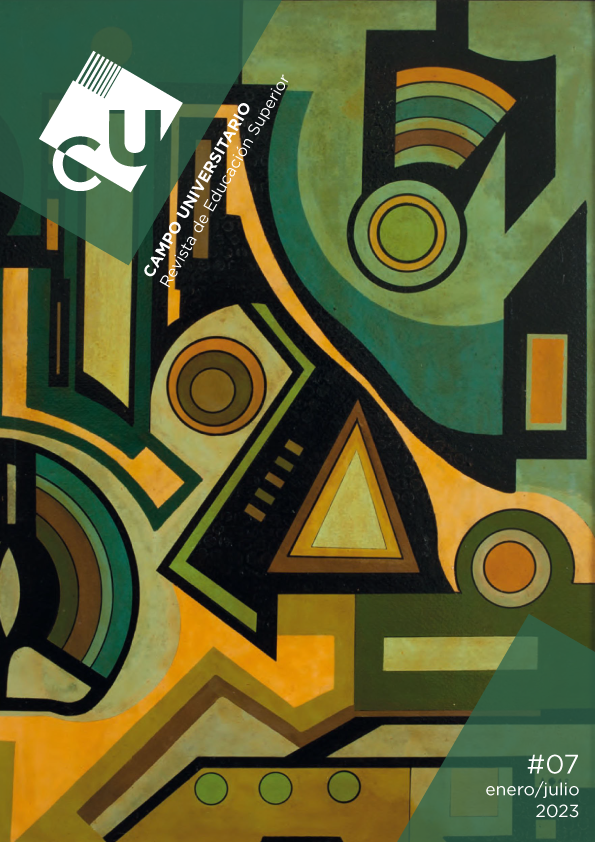Una exposición y valoración de un ejemplo de PBL en tiempos de pandemia: Coronaninjas UR
Contenido principal del artículo
Resumen
Este estudio presenta la adaptación telemática de una asignatura presencial y valoración, debido a la situación de confinamiento en España durante 2020 por el COVID 19. Se explica el contexto de adaptación docente, el marco teórico en el que se basó y la metodología utilizada. Igualmente, se detalla el estudio realizado de esta adaptación docente, una vez acabado el curso: participantes, instrumentos y procedimiento, objetivos, análisis y discusión de datos para valorar objetivamente los resultados.
Detalles del artículo

Esta obra está bajo una licencia internacional Creative Commons Atribución-NoComercial-CompartirIgual 4.0.
Citas
BIBLIOGRAFÍA
Achard, M. y Niemeier, S. (Eds.). (2004). Cognitive Linguistics, Second Language Acquisition, and Foreign Language Teaching. Berlin: Mouton de Gruyter.
Barcena, E., Read, T. y Arús, J. (Eds.). (2014). Language for specific purposes in the digital era. Nueva York: Springer.
Barreras, A. (2017). Modelo PBL en la docencia universitaria de la didáctica de la lengua inglesa. Tejuelo. Didáctica de la lengua y la literatura. Educación.
Bloor, M. (1991). The Role of Informal Interaction in Teaching English to Young Learners. Teaching English to Children. From Practice to Principle, 127-141.
Bozkurt, A. y Sharma, R. (2020). Emergency remote teaching in a time of global crisis due to CoronaVirus pandemic. Asian Journal of Distance Education.
Broughton, G. Brumfit, Chr. Flavell, R. Hill, P. y Pincas, A. (1980). Teaching English as a Foreign Language. London: Routledge.
Brumfit, C. Moon, J. y Tongue, R. (1991). Teaching English to Children. From Practice to Principle. London: Collins ELT.
Chai, K. (2015). The principles and the ways of classroom interaction. 1st international conference on arts, design and contemporary education. ICADCE.
Clayton Whittle, S. Shulong Y. y Williams, J. (2020). Emergency remote teaching environment: a conceptual framework for responsive online teaching in crises. Information and Learning Sciences.
De Knop, S. y Gilquin, G. (Eds.). (2016). Applied Construction Grammar. Berlin: Mouton De Gruyter.
Del Pozo Flórez, J. (2012). Competencias profesionales: Herramientas de evaluación: el portafolios, la rúbrica y las pruebas situacionales. Madrid: Narcea Ediciones.
Dooly, M. y Sadler, R. (2016). Becoming little scientists: technologically-enhanced Project-based language learning. Language learning and technology.
Edge, J. (1994). Essentials of English Language Teaching. London: Longman.
Grant, M. (2011). Learning, Beliefs, and Products: Students’ Perspectives with Project-based Learning. Interdisciplinary Journal of Problem-Based Learning.
Hsu, Y. Ching, Y. y Grabowski, B. (2014). Web 2.0 Applications and practices for learning thorugh collaboration. Handbook of research on educational communications and technology, 747-758.
Huergo-Tobar, P. (2015). Estrategias de enseñanza- aprendizaje a través de videoconferencias. Rastros Rostros.
Imaz, J. (2015). Aprendizaje basado en proyectos en los grados de Pedagogía y Educación Social: ¿Cómo ha cambiado tu ciudad?. Revista complutense de educación.
Jones, B. Rasmussen, C. y Moffitt, M. (1997). Real life problem solving: A collaborative approach to interdisciplinary learning. Washington D. C.: American Psychological Association.
Koveses, Z. (2010). Metaphor: A practical introduction. Oxford: Oxford University Press
Kristiansen, G. Achard, M. Dirven, R. y Ruiz de Mendoza, F. (eds.). Cognitve approaches to pedagogical gramar. Applications of Cognitive linguistics. Berlin & New York: Mouton de Gruyter.
Lakoff, G. (1990). The Invariance Hypothesis: Is abstract reason based on image-schemas? Cognitive Linguistics.
Lakoff, G. y Johnson, M. (1980). Metaphors We Live By. Chicago: Chicago University Press
Larmer, J. Mergendoller, J. y Boss, S. (2015). Setting the Standard for Project Based Learning: A Proven Approach to Rigorous Classroom Instruction. Alexandria: Association for Supervision & Curriculum Development.
Major, C. y Palmer, B. (2001). Assessing the effectiveness of problem-based learning in higher education: lessons from literature. Academia Exchange Quarterly.
Malamah-Thomas, A. (1987) Classroom Interaction. Oxford: Oxford university press.
Marx, R. Blumenfeld, P. Krajcik, J. y otros (1994). Enacting project-based science: Experiences for our middle grade teachers. Elementary School Journal.
Mounoud, P. (2001). El desarrollo cognitivo del niño: desde los descubrimientos de Piaget hasta las investigaciones actuales. Contextos educativos.
Phillips, S. (1993). Young Learners. Oxford: Oxford University Press.
Pinzón Castañeda, R. (2014). English teaching through Project based learning method in rural área. Cuadernos de lingüística hispánica.
Pütz, M. Niemeier, Su. y Dirven, R. (Eds.). (2001a). Applied cognitive linguistics II: Language pedagogy. Berlin & New York: Mouton de Gruyter.
Pütz, M. Niemeier, Su. y Dirven, R. (Eds.). (2001b). Applied cognitive linguistics I: Theory and language acquisition. Berlin: Mouton de Gruyter.
Ravitz, J. Hixson, N. English, M. y Mergendoller, J. (2012). Using project based learning to teach 21st Century skills: Findings from a statewide initiative. PBL and 21st Century Skills.
Ríos, M. (2016) “Google Docs en Educación Universitaria. Usos para la enseñanza y el aprendizaje en la Licenciatura en Educación de los EUS-UCV ” CIES Centro de investigación Educativas. Recuperado a partir de https://www.researchgate.net/publication/329362185_Google_Docs_en_Educacion_Universitaria_Usos_para_la_ensenanza_y_el_aprendizaje_en_la_Licenciatura_en_Educacion_de_los_EUS-UCV
Rondal, J. (1999). El desarrollo del lenguaje. Barcelona: Isep Universidad Publicaciones del instituto superior de estudios Psicológicos.
Spector, M. Merril, D. y Bishop, J. (Eds.). (2014). Handbook of research on educational communications and technology. Nueva York: Springer.
Ruiz de Mendoza, F. (2008). Cross-linguistic analysis, second language teaching and cognitive semantics: The case of Spanish diminutives and reflexive constructions. Cognitve approaches to pedagogical gramar. Applications of Cognitive linguistics, 212-155.
Thomas, J. (2000). A Review of Research on Project-Based Learning. San Rafael, C.A.: Autodesk Foundation.
Verma, A. Dickerson, D. y McKinney, S. (2011). Engaging Students in STEM careers with Project-Based Learning – Marine Tech Project. Technology & Engineering Teacher.
Zanón, J. (1992). Cómo no impedir que los niños aprendan inglés. Conocimiento, lenguaje y educación.

